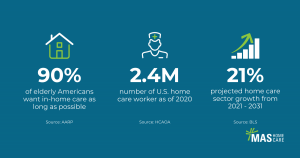Home Care Blog

Building a Thriving, Flexible Career in Home Care
Flexible hours. Instant Pay. Making a difference in people’s lives. Sounds like a dream job, right? Well, that’s exactly what a career in home care offers you.
Over two million Americans work in home care. One of its biggest draws: flexibility. In-home care isn’t a 24/7 job, meaning it works around your life, not the other way around. One of our caregivers put it well, “[This career] allows me to have flexibility in my life. I can pick up a shift, and go where I’m needed.”
So if you’re in the New England area, need a change, and want a flexible career where you can thrive, read on to see if home care is a good fit.
Explore home care roles in Maine, Massachusetts, New Hampshire, and Rhode Island here.
What is home care?
Home care involves helping people who need support to live independently in their home. These can include people who are aging, recovering from a recent or temporary medical setback, or have special needs or a disability.
Home care support takes many forms, depending on the client’s needs:
- Assistance with the activities of daily living (ADLs), like dressing and bathing
- Homemaking assistance, like cooking, cleaning, and laundry
- Companionship, conversation, and social interaction
- Transportation both for errands and recreational activities
- In some cases, therapy and rehabilitative services—or even short- or long-term nursing care
Home care’s goal is to maximize the client’s independence and control over their situation. As 90% of adults 65 or older want to “age in place” (AARP), home care support is vital in maintaining clients’ quality of life.
Home care vs. home health care
The types of support offered through in-home care fall into two broad categories. The first is what we typically refer to as home care, encompassing those non-medical services listed above. The second is home health care, which includes medical support and is typically offered by trained and certified home health aides and registered nurses. The specific requirements for home health certification vary by state.
And to make things nice and confusing, many people casually refer to the whole range of services—medical and non-medical—as home care.
The advantages of a home care career

Career independence & flexibility
Home care is shift work, and clients are rarely particular about when those shifts take place. In fact, they’ll tolerate an unpredictable schedule if it means working with the same person every day.
As such, you have a lot of flexibility and independence to set your own hours and work around your life. Our caregivers include teachers and full-time students picking up shifts over the summer, and parents with school-age children who need to be off by 3:00.
Whatever your situation, you can work a home care career around your life. But that independence doesn’t mean you won’t have support. Home care workers who partner with an agency like MAS Home Care, get the advantage of local, New England-based career specialists who will find work, guide you through certification processes, and offer ongoing assistance.
Make a difference at work
A recent study from the American Psychological Association shows people overwhelming want work that will make a difference . If that’s you, home care is a perfect opportunity to tangibly and directly improve people’s quality of life—not just clients, but also their family members.
Job security
Home care is a thriving industry. As the average age of Americans continues to increase year over year, more people will need support to maintain their quality of life.
Here are some signs that the industry is growing:

How to thrive in a home care career
If you’re serious about home care as a career path, here are some ways we’ve seen caregivers across Maine, Massachusetts, New Hampshire, & Rhode Island succeed in their roles.
- Find out where you fit in the client’s home care plan
Clear expectations are key to avoiding conflict and other problems. If your client has a home care plan, it’s important to know where you fit, what’s expected of you, and if there are other caregivers (i.e. medical professionals) you’ll be interacting with. If you work with an agency, they can help you navigate this process. - Let the client lead
A core principle of home care is autonomy, so it’s important to let your client take the lead. Since you’re helping with personal activities—bathing, toilet use, etc. —you want them to feel as comfortable as possible. If they aren’t, and it isn’t necessary for safety or sanitary purposes, just let it be. Sometimes the best thing you can do for a client is just sit and talk. - Talk to them like a friend
The operative word in our industry is “care.” In some corners of our industry, caregivers are actually called “companions,” because it’s important that you treat clients as a friend. When you respect and care for your client, they’ll respect you. - Watch for and report any “red flags”
All caregivers, regardless of whether you’re a medical professional or not, should look out for “red flags.” These include indicators of poor health, a change in mental state or mood, or any other cause for concern. Report them immediately. The faster you can treat these “small” issues, the less likely they’ll balloon into serious problems. - Work with an agency
Just because home care work is flexible and per diem doesn’t mean you have to go it alone. When you partner with an agency like MAS Home Care, you truly get the best of both worlds. MAS Home Care specifically offers all the advantages of full-time employment for home care workers in Maine, Massachusetts, New Hampshire, & Rhode Island: W-2 status, benefits, consistent pay, and a supportive team to help you ramp up, ramp down, and adjust your needs. What’s more, you get to be part of an organization that prides itself on top-notch service, both to our caregivers and the clients they serve. This includes:- Consistent work. While we can’t guarantee constant work, our track record of regular, consistent opportunities is strong.
- Training & certification support. We invest in training for all our caregivers, which has been proven to reduce client complaints. These include diet plans, fall prevention techniques, safe patient transfers, and more.
- Responsive & professional office staff. We prioritize staff that respond promptly to your requests and engage in a respectful manner.
As one of our caregivers said,”I love working for MAS because teamwork and the feeling of being part of something bigger truly fill my cup. I have found something I love doing so it never feels like work!”
How much can you earn in home care?
Based on our original data from home care workers in New England area, the average range for non-medical home care is $17 to $22 per hour. For LPNs & RNs providing medical support, the range is $32 to $42 per hour.
Ready to get started? Ask yourself: can you picture yourself working in home care? If so, explore roles in the New England area and get started today.



